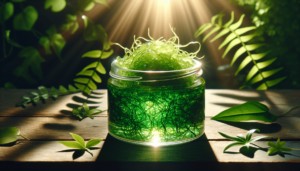The Best Fluffy Pancakes recipe you will fall in love with. Full of tips and tricks to help you make the best pancakes.

Have you ever wondered about the potential effects of sea moss on your kidneys? It’s a common question among those who are curious about adding this nutrient-packed aquatic plant to their diet. In this article, we’ll explore the topic and shed some light on whether sea moss poses any risks to your kidney health. So, let’s set sail and navigate through the murky waters of this intriguing query.

What is Sea Moss?
Sea moss, also known as Irish moss or Chondrus crispus, is a type of seaweed that is commonly found along the Atlantic coastlines of Europe and North America. It has been consumed for centuries due to its potential health benefits and nutritional value.
Definition of Sea Moss
Sea moss is a red algae that grows in rocky coastal areas and is harvested for its gel-like substance. This seaweed is rich in essential nutrients, including vitamins, minerals, and antioxidants. It is often used in various culinary dishes, such as soups, smoothies, and desserts, as a thickening agent or a vegan substitute for gelatin.
Benefits of Sea Moss
Sea moss has gained popularity in recent years due to its numerous potential health benefits. It is believed to support overall well-being and promote various bodily functions. Some of the key benefits associated with sea moss include:
-
Improved Digestion: Sea moss contains a high amount of fiber, which can aid in maintaining a healthy digestive system and preventing constipation.
-
Enhanced Immune Function: The seaweed is rich in vitamins and minerals, such as vitamin C, iron, and zinc, which can help boost the immune system and protect against common illnesses.
-
Skin Health: Sea moss is also known for its potential benefits for the skin. It is believed to hydrate and nourish the skin, promote collagen production, and support a healthy complexion.
-
Thyroid Health: Some studies suggest that sea moss may have potential benefits for thyroid health due to its iodine content, which is essential for proper thyroid function.
-
Nutritional Value: Sea moss is a nutrient-dense food that provides a wide range of vitamins and minerals, including potassium, calcium, magnesium, and vitamins A, E, and K.
While these potential benefits are promising, it is essential to understand the impact of sea moss on specific health conditions and organs, such as the kidneys.
Understanding Kidney Health
The kidneys play a vital role in maintaining overall health by filtering waste products and excess fluid from the blood, regulating electrolyte balance, and producing hormones that control blood pressure and red blood cell production. However, various factors can affect kidney health and lead to kidney damage.
Function of Kidneys
The main function of the kidneys is to filter the blood, removing waste products and excess fluid that are then excreted as urine. Additionally, the kidneys help regulate electrolyte levels in the body, such as sodium, potassium, and calcium, to maintain proper balance.
Causes of Kidney Damage
Several factors can contribute to kidney damage, including:
-
High Blood Pressure: Uncontrolled high blood pressure can strain the blood vessels in the kidneys, leading to kidney damage over time.
-
Diabetes: Diabetes is one of the leading causes of kidney damage. High blood sugar levels can damage the blood vessels in the kidneys and impair their filtration function.
-
Infections: Certain infections, such as urinary tract infections and kidney infections, can cause inflammation and damage to the kidneys if left untreated.
-
Medications and Toxins: Some medications and toxins, when used in excess or for prolonged periods, can have harmful effects on the kidneys. Examples include nonsteroidal anti-inflammatory drugs (NSAIDs) and certain antibiotics.
It is crucial to prioritize kidney health and take steps to prevent damage or manage existing conditions.
Sea Moss and Kidney Health
Claims about Sea Moss and Kidney Health
There are claims that sea moss may have potential benefits for kidney health. Some proponents suggest that the seaweed’s high mineral content and potential anti-inflammatory properties could support kidney function and help prevent kidney damage. However, it is essential to consider scientific research in evaluating these claims.
Scientific Research on Sea Moss and Kidney Health
Limited scientific research is available specifically examining the impact of sea moss on kidney health. Most studies on sea moss have focused on its nutritional content and potential benefits for general health rather than kidney-specific effects. Therefore, more research is needed to determine the true impact of sea moss on kidney health.
While sea moss may offer some potential benefits, it is important to consider potential risks associated with its consumption.
Potential Risks of Sea Moss
Contamination and Quality Control
One of the concerns associated with sea moss is contamination. As seaweed is harvested from the ocean, it may absorb heavy metals and other pollutants present in the water. Therefore, it is crucial to ensure that the sea moss you consume comes from a reputable source that conducts thorough quality control measures to minimize contamination risks.
Allergic Reactions
Sea moss is derived from seaweed, and some individuals may be allergic to seaweed or have sensitivities to iodine. Allergic reactions can range from mild skin irritations to more severe symptoms, such as difficulty breathing or anaphylaxis. If you have a known allergy to seaweed or iodine, it is essential to avoid consuming sea moss.
Interactions with Medications
Sea moss may interact with certain medications, especially those that affect blood-thinning or blood pressure. For example, sea moss has a naturally occurring anticoagulant effect, and consuming it alongside blood-thinning medications may increase the risk of bleeding. It is important to consult with a healthcare professional before incorporating sea moss into your diet if you take any medications.
Considering these potential risks, it is important to maintain a balanced approach when it comes to sea moss consumption and kidney health.

Kidney Health Tips
In addition to considering sea moss, there are several key lifestyle habits that can help support kidney health:
Maintaining a Healthy Diet
Eating a nutritious diet that includes a variety of fruits, vegetables, whole grains, lean proteins, and healthy fats is crucial for kidney health. Limiting processed foods, sodium, and added sugars can also help reduce the risk of kidney damage.
Staying Hydrated
Adequate hydration is essential for proper kidney function. Drinking enough water throughout the day can help flush out waste products and toxins from the kidneys.
Avoiding Excessive Salt Intake
Excessive salt intake can lead to high blood pressure and increase the strain on the kidneys. It is important to limit the consumption of salty foods and use herbs and spices to enhance the flavor of meals instead.
Limiting Alcohol Consumption
Alcohol can have detrimental effects on the kidneys and lead to dehydration and electrolyte imbalances. Moderating alcohol intake or avoiding it altogether is recommended for optimal kidney health.
Managing Blood Pressure and Diabetes
If you have high blood pressure or diabetes, managing these conditions effectively is crucial for kidney health. Regularly monitoring blood pressure, blood sugar levels, and following the prescribed treatment plan is essential.
Consulting a Healthcare Professional
Importance of Medical Advice
Before incorporating any new food or supplement into your diet, it is important to consult with a healthcare professional, especially if you have pre-existing health conditions or take medications. They can provide personalized advice based on your specific needs and potential risks.
Discussing Sea Moss Consumption with a Doctor
If you are considering incorporating sea moss into your diet for potential kidney health benefits, discuss it with your doctor. They can assess your medical history, medications, and overall health to provide guidance on whether sea moss is appropriate for you and how it may fit into your overall kidney health plan.

Conclusion
Balancing the potential benefits and risks of sea moss is essential when considering its impact on kidney health. While sea moss offers various potential health benefits, including potential support for the kidneys, limited scientific research specifically focused on its effects on kidney health exists. Moreover, potential risks such as contamination, allergic reactions, and interactions with medications should be considered. Prioritizing kidney health through lifestyle habits like maintaining a healthy diet, staying hydrated, avoiding excessive salt and alcohol intake, and managing conditions like high blood pressure and diabetes is crucial. Lastly, consulting a healthcare professional and discussing sea moss consumption before making any dietary changes is recommended to make informed decisions regarding kidney health.



